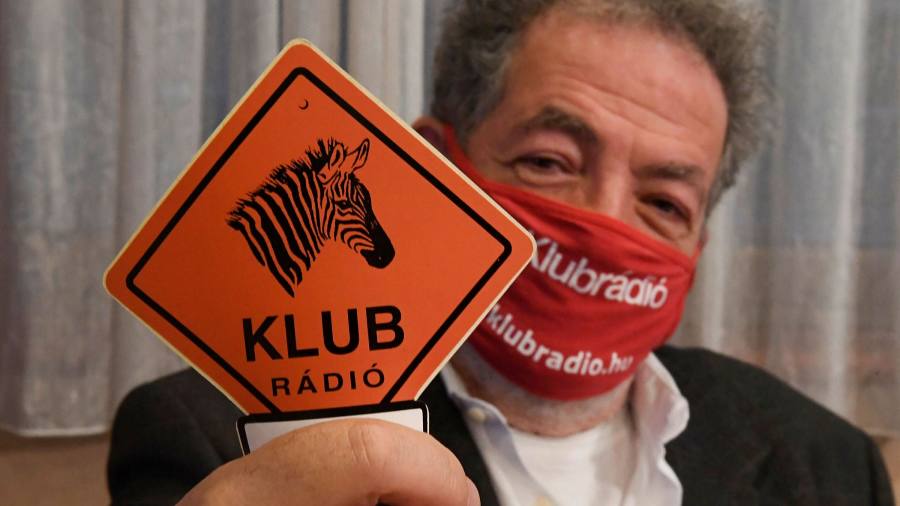[ad_1]
At midnight on Sunday, independent Hungarian radio station Klubradio will disappear from the airwaves — a shutdown its supporters say makes its studios in a Budapest suburb the front line in prime minister Viktor Orban’s media crackdown.
The move comes after the broadcaster, which has been critical of Mr Orban and his ruling conservative Fidesz party, last week lost a lawsuit in which it sought to overturn a decision by Hungary’s media regulator not to renew its operating licence. Its 300,000-strong audience will now have to listen to it on the internet.
The EU has condemned the ruling, saying it “aggravates†fears over media pluralism in Hungary, while opponents say it is part of a wider clampdown on independent and progressive voices in central Europe amid concerns over press freedom in neighbouring Poland.
“Even in Putin’s Russia, there are independent radio stations,†Mihaly Hardi, Klubradio’s head of news and current affairs, told the FT. “While in Russia, they kill journalists, in Hungary they kill radio — or the media itself.â€
Since Orban returned to power in Hungary in 2010, his ruling Fidesz party has tightened its grip on the country’s administrative and cultural institutions, judiciary and media.
The government has forced a flagship university founded by billionaire investor George Soros to withdraw from the country and demands that NGOs receiving foreign funding register as foreign agents despite a ruling by the EU’s top court that the measure contravenes the bloc’s values. Orban has also attempted to tighten control over the judiciary, appointing loyalists to key positions.
The move against Klubradio comes after years of pressure on the media. Last year Index, the country’s most respected independent news portal, was effectively taken over by Orban allies. In 2018, the merger of almost 500 pro-government news outlets under the management of a single foundation further consolidated control by pro-government figures.
In ruling against Klubradio last week, the court upheld the media council’s decision not to renew the station’s licence because in 2017 it had made two minor administrative infractions. It also said that in paying fines for the breaches the station had not contested its guilt.
Andras Arato, Klubradio chief executive, dismissed the criticism and said the infractions had been small. “It is obvious to everybody that this was not a legal decision but a political decision, coming from the very centre of the government,†he said. “This war against independent media began in the very moment when Fidesz came into power.â€
Between 2010 and 2011, he said, Klubradio lost 90 per cent of its advertising income as government agencies and companies run by businesspeople close to the government withdrew campaigns from independent and left-leaning media.
Zoltan Kovacs, a spokesman for the government, denied allegations of political interference, saying in a blog on a ministry website that “the government has neither the right, the will, nor the possibility to interfere with the legal disputes of private market actors, the media authority and the courtsâ€.
But observers point out that the members of the media regulator were appointed by the government. “The media council is not an autonomous authority: all members have been delegated by the ruling party,†said Agnes Urban of Mertek Media Monitor, an independent Budapest-based media watchdog. “It is absolutely obvious that this was basically a decision of the government.â€
Brussels condemned the court verdict. A spokesman for the European Commission said the case “only aggravates our concerns†about press pluralism in Hungary. Dunja Mijatovic, the Council of Europe’s human rights commissioner, tweeted: “Another silenced voice in Hungary, another sad day for media freedom.â€
Because of EU concerns over the pressure on civil society and rule of law, both Hungary and Poland are subject to Article 7 proceedings in Brussels. This means they could theoretically lose their voting rights in the bloc, although each has promised to veto any move against the other.
German-owned RTL was now the only traditional media outlet operating nationally in Hungary, said Urban. “Besides RTL, consumers of traditional media get basically government propaganda. The internet is the only free segment in the media landscape that remains,†she added.
The independent media has also come under pressure in Poland, where state-controlled oil refiner Orlen — run by a close ally of the ruling conservative Law and Justice Party — bought 20 of the country’s 24 regional papers in December in a deal that sparked concerns over press freedom. Private TV and radio stations suspended their news coverage for 24 hours last week in protest at a proposed new tax on advertising that they fear will cripple independent news groups.
Both countries have fallen dramatically in world press freedom rankings. Hungary dropped from 53rd place in 2013 to 89th in the Reporters Without Borders (RSF) index of 180 countries in 2020, while Poland fell from 22nd place in 2013 to 62nd last year.Â
In Hungary, government supporters reject claims that Fidesz is targeting media critics. The upheaval in the sector is an attempt to “rebalance†it away from the political left after decades of communism, said Agoston Mraz, director of the government-funded Nezopont research institute.
But, warned Hardi, removing a Budapest-based station with a relatively small following was like “removing a valve where pressure could go outâ€.Â
Leaders with authoritarian ambitions were learning from Hungary, said Zselyke Csaky of the watchdog Freedom House.
“What’s happening in Poland is concerning,†she said, “because we see the Hungarian model spreading to other countries.â€
Additional reporting by James Shotter in Warsaw.
[ad_2]
Source link






